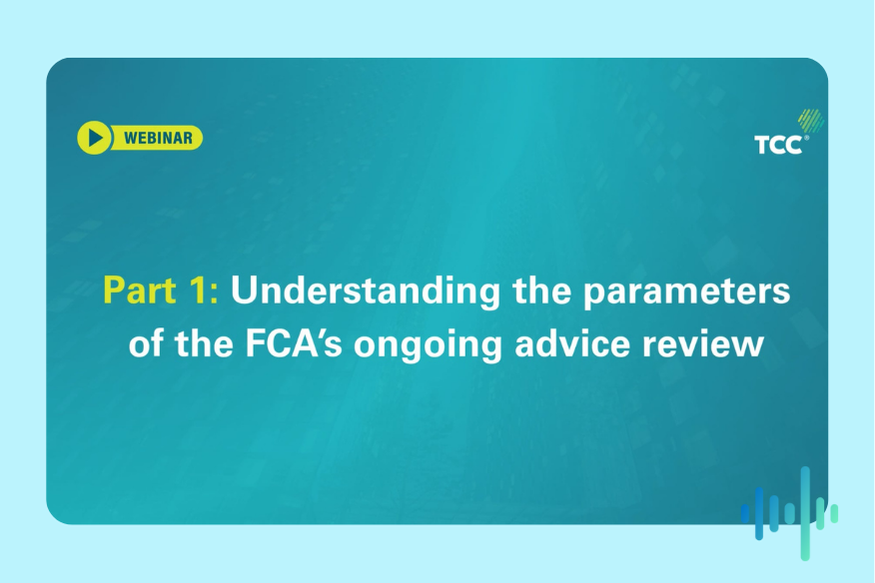In the final part of our sister company TCC’s recent webinar, entitled ‘What Risks Remain for Firms Following the FCA’s Ongoing Advice Review Findings?’, they continue to share their house view on the regulator’s latest communication for wealth managers.
Recordsure’s Chief Product and Chief Commercial Officer, Garry Evans, was joined by TCC’s in-house regulatory experts, Gary Maude and David Boyhan.
Watch the final instalment, where they explore how wealth management firms can deliver long-term compliance advice for their ongoing advice services and why RegTech plays an important role in evidencing ongoing advice reviews and building actionable MI.
You can read the transcript below.
Garry Evans
I think it’s fair to say that whilst the FCA haven’t been and likely never will be explicit in their requirements for regulated firms, hopefully what Gary and David have shared there in terms of the TCC house view at least makes it clear what we believe the correct interpretation is from the FCA.
Now, the next poll is concerning your current plans on whether you’re going to conduct a past business review or not. As I mentioned at the top of the webinar, I believe the FCA has indicated it doesn’t think there’s a large redress population out there, but the need for the past business review is being solidified back to 2018. I’m keen to understand whether you guys are actually planning to conduct a review or not.
Very interesting. Do you know what? There’s a large part of me that expected there to be more than the bottom half of the of the top half of this poll. So, so for those of you who are planning on doing something, it’s really good to see a pragmatic approach here. Despite the kind of de-escalation of the FCA, I don’t think for a second they’ve actually forgotten about this as an issue. And for those of you in the bottom half who aren’t necessarily planning on doing something. I do think it’s a fairly predictable response. We may well see the fall out of this, when the FCA come back around in six months time. As a minimum, what we would recommend at least doing is collecting a meaningful sample review, so that firms can make a kind of educated assessment of how much of a problem or not, that they may have when the FCA comes around to check in.
Now, Gary, David, obviously we’re involved in a lot of ongoing servicing projects currently. It’s been a, a great source of, of revenue for us and interest over the last 12 months, funnily enough. There are measures wealth managers could put in place to ensure they are 100% compliant with this. And they could never have any negative mentions of them at all, but they are quite onerous and expensive.
What I imagine is key for everyone on this webinar is your view of what that kind of minimum acceptable set of measures that will result in no negative FCA tension, which is not what any of us want.
David Boyhan
I’ll take that one, Garry, and then again I’ll see if Gary Maude’s got anything to add. And I’m a bit mindful of time as well. So, I’ll try to make this as a succinct as, possible. It’s crucial to remember that the FCA for our sector wealth management, the FCA, has had ongoing advice in the past two portfolio strategy letters. And whilst we’re all very happy with the findings that were released last month, it’s clear this isn’t an issue that’s gone away from the FCA, and it will come back later in the year.
As Gary’s mentioned, I’m an ex FCA supervisor, and the last thing you ever wanted to do or hear when you turned up was a firm say, “we haven’t done anything”. I think the question is what are the minimum expectations that we would recommend firms to do, which is that backwards-looking piece that I talked about in quite a lot of detail going back to 2018. But in terms of the forward-looking piece, it’s really looking at your fair value assessments. That’s going to be crucial. It’s making sure that the MI is being reviewed as well from your past business review.
A key thing will be a disengagement process. We speak to many firms when you ask them about how many clients have disengaged in the past 12, 24, 36 months, it’s a, it’s a handful, if any. I think the FCA will be expecting to see a material number of clients being disengaged who haven’t been using a service and then you need to take into account vulnerable clients and so forth. In short, our advice would be make sure you do the backward looking piece, but also make sure your current processes, meet the requirements specified by the FCA. Gary, did I miss anything there?
Gary Maude
Only again, just to add a couple of things, I would use a slightly different word to minimum. Personal bias. I would use proportional because not everyone on the call is the same size and complexity – you don’t have the same number of clients, etc.
There has to be some work on proportionality, particularly if firms are going to go down a, an attempt to – and we do this quite often by the way – we quite often avoid S166’s and vrex by taking a proportionate sample of files. And even if those files are not particularly the tidiest in the world, trying to drive a conclusion of no customer detriment here, now, that will depend on the quality of, advice for each individual firm. But nonetheless, that proportionality can be a way that you can maybe avoid a wide scale PBR.
Now, we have so far seen firms struggle to even collate the information of all the different systems, whether it be the systems are old, have changed, information is lost, some information is paper based and never been scanned etc. We have seen firms struggle – to use an Americanism – data mine, and that means there can be fluctuating confidence in the evidence you have, and consequently, that can affect your next steps. So, your confidence in sampling, we spoke about, ability to consider adviser adherence to your own process, which may have PI implications or disciplinary implications. And also, of course, ongoing provisioning implication of how able are we to defend the, the possibility of doing larger scale PBR and attempting a causation approach to whether or not it can stand up to reasonable expectations of the regulator, reasonable expectations of the PI insurer, who’s going to be responsible on the hook for redress. Depending on what you see and depending on how they’ve adhered to run processes and indeed whether your own process is clear enough or has implications for, you know, next stage implications, going forward.
I’ve already mentioned the real-time scenarios we’re seeing of firms, in the main struggling to put together a full cohesive pack of information that would be used to determine whether advice has taken place and the quality of it. And so many firms are now talking about, if we’ve done something – and we’ve done lots of good things that may or may not marry up to our terms and conditions – where does that leave us in respect of redress?
And some of you, many of you no doubt, will be aware that St James’ Place are having that conversation with us at the moment over what I understand is called Mr B for now. It’s something that many of you will be speaking to your legal representatives about, and DAC will be covering off for more detail next Wednesday. And as I said, if there is going to be redress, the clarity of chronology and frequency of client contact and/or attempted client contact and the mediums that you used within that contact could all be relevant when it comes to causation. Not least, when would the client or should the client reasonably have challenged you which of which is not necessarily the same as you can put all the responsibility on them to, opt out, etc but it’s all, relevant, nonetheless. Garry, back to you.
Garry Evans
Thank you, Gary. Now, we did have a last poll on redress. But I see the time. I’ve only got 2.5 minutes left, and so I’m going to skip that one. We’ll put a little a bit more of the house view on redress into the, the follow up note. But unfortunately, we are coming to the end of the webinar now, so, I don’t have any time for the questions. And it’s really good questions which we answer, and we will get back to you, in the follow up note of this webinar. But I wanted before we finished to quickly summarise some of the key elements and the TCC house view.
Certainly, the findings from the FCA were surprisingly positive. But the fact that the survey results were self-reported and the burden of evidence in the findings wasn’t really present, they’re probably more positive than the market actually is.
That aligns with your sense as well. The FCA has indicated a low redress population, but despite not explicitly calling this out as a requirement, that is still an expectation that wealth managers can, and will identify which category client fall into for each of the service review periods back to the start of 2018 – and then at least redress the 2% that weren’t offered a review. MI based on practice management system data will not be acceptable as evidence of a review taking place.
The actual evidence we believe is required is at least, updated KYC, some sort of recent attitude to risk documentation, and an updated suitability letter or in the case of declines and disengagement, proof of contact for every service review period. Very quickly jump on one of the questions of “is email acceptable?”
The email is probably one of the most acceptable, channels because it’s literal proof of being able to do it. If you have a recording of a conversation, even better. Clients who weren’t offered a review for any period should have their fees refunded for that period. At the moment, we do not believe that any kind of consequential loss, kind of questions your requirement at the moment. And then upon the historic review, clients with multiple service review periods where they have declined or not engaged with the process should have their fees refunded for every period after the second decline of this engagement. I think David mentioned, if you could have five or six, all disengaged, that’s a problem. Clients who upon review have had more than one year declined or disengaged and are live, should have to opt in to continue an ongoing advice service and any client with no change reviews for more than two years in a row should have suitability advice checked.
I’m going to sign off with the caveat that these are TCC house views. They’re our interpretation of the FCA guidance and the FCA letter. They are not directly from the FCA, but hopefully they are a useful benchmark for you.
Ready to watch the rest of the webinar? You can watch the full 30 minutes below.
Revolutionise your suitability assessments with cutting-edge AI integration. Recordsure AI streamlines document verification, alerting you solely when crucial information is absent, empowering your advisors to act with pinpoint accuracy.





